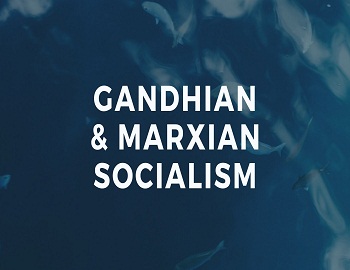Gandhian and Marxian Socialism:
A comparative study of Gandhian and Marxian socialism is of great value. Both were extremely concerned with the fate of the exploited, depressed, resourceless and the dumb, the ignorant, the starving and the humanity crushed under the heels of the pursue-proud and the power puffed. Both dreamt of a new order of society in which the common man and women will enjoy full human rights without hindrance and oppressions and in which exploitation will be the memory of the past. Each prescribes a method through which the ideal is to be made a reality. But whereas Marx advocates violence, Gandhi sticks to non-violence in thoughts, words and deeds. Marx would coerce but Gandhi would persuade. Marx held that life had its origin, sustenance and its dissolution in the matter and not vice versa. What is imagined as spirit or soul is, in fact, the development of material forces. There is no spiritual principle but matter.
The basic principle of Gandhi, on the contrary, is life. Life alone exists. It is one. The universe is the manifestation of life. Thus the attitude of Gandhi towards life and the universe is not just different from that of Marx but quite opposite to it. Whereas Marx speaks of matter, Gandhi speaks of God.
Means employed by Gandhi and Marx again are not just different from each other but quite opposite. Marx proposes that in order to achieve socialism first the capitalist system is to be liquidated root and branch and on the ruins of the old a new society is to be built. With regard to religion to there is an extreme difference between Gandhian and Marxian Socialism. The Marxists are the born enemies of religion. Gandhi takes religion as the sheet anchor of life. It must govern all life. Gandhi owes his love of mankind to the love of God. “I trust men only because I trust God”, he said.
In conclusion, one is the apostle of class struggle, the other of love and non-violence. Marx preaches conflict and antagonism; Gandhi preaches and practices cooperation and collaboration. Marx postulates eternal hostility between labour and capital; Gandhi stresses the need of establishing the right relationship and understanding between the two. Gandhi repudiates Marx’s economic materialistic interpretation of History.









Comments (No)